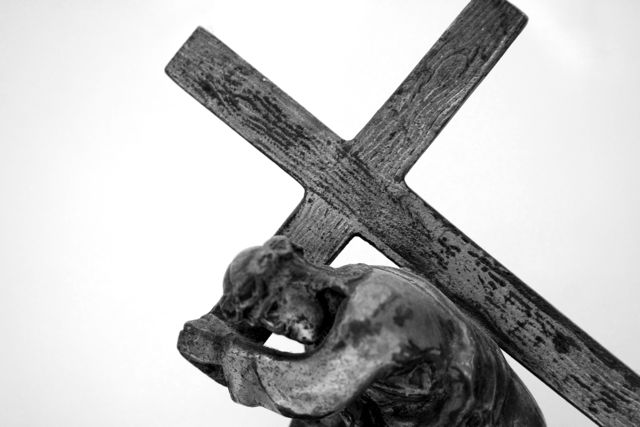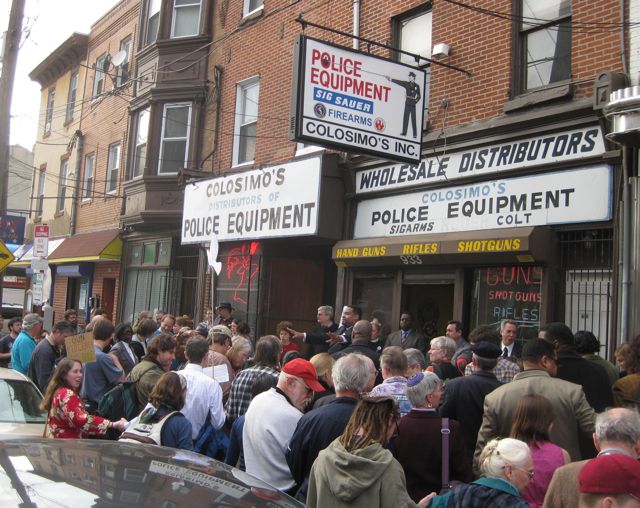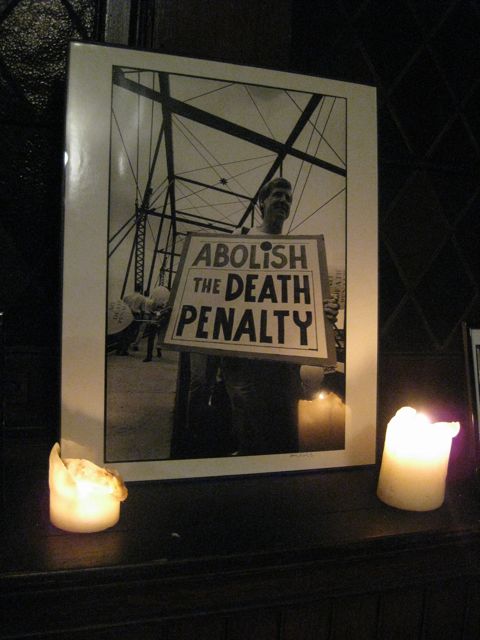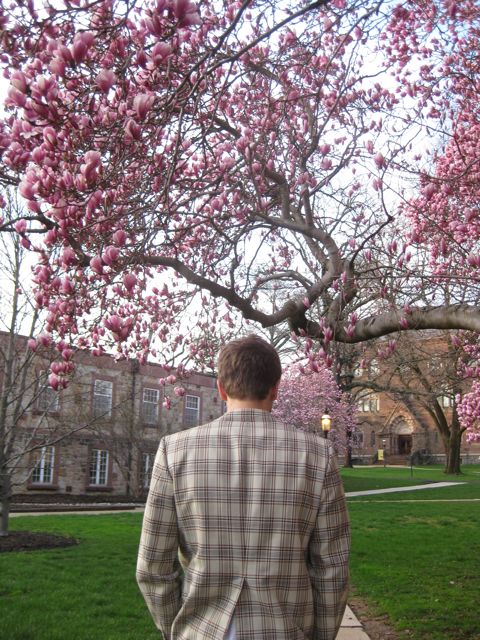
The Courage to Call it Good Friday

1:30 pm - Stations of the Cross
The Stations of the Cross is a way of remembering the suffering and sacrifice of Jesus during his last hours. The tradition dates back to the fifth century and eventually formed into fourteen “stations,” each depicting a different scene of Jesus’ journey to the cross. I’ve experienced the Stations of the Cross a number of times inside churches that have them set up on clean walls. But not this time.
Circle of Hope (in east Philadelphia) does the stations every year on the streets of their neighborhood and they’re not “set up” - the stations are envisioned through the real images of the city. As I walked with a few friends pausing at each station and reading aloud scripture, I felt passion swelling inside of me for both Jesus and the urban centers of the world. Good Friday just makes a lot more sense when seen through the nitty-gritty streets of a noisy city than the sanitized walls of a quiet sanctuary.
We saw Jesus right there in the middle of the pure and the profane. Cars rolled by blaring hip-hop, a couple argued inside a local bar, and teenagers shadowboxed on the street corner as we contemplated the Savior struggling through the streets of Jerusalem with a cross on his back headed toward a small hill on the outskirts of the city.
In 1900, 8% of the world’s population lived in cities. Today the number is over 50%. The Stations of Cross in east Philly reminded me that we need a faith big enough for the city and a theology relevant to the reality of urban life.
4:00 pm - Protest Colosimo’s Gun Shop

Colosimo’s gun shop was named one of the ten worst gun dealers in the country due to the number of handguns it sells traced to crimes, and its owner is notorious for selling to straw purchasers who supply the criminal market. A group of peace churches have been asking Mr. Colosimo to sign the same Code of Conduct that Wal-Mart agreed to, but he has refused. So a large group of us met Friday afternoon to speak out against the greed and crookedness of this business. We prayed, sang hymns, and marched in front of his shop.
Gun violence has a lot to do with Good Friday. It was on this day that Jesus and his small band of disciples were ambushed by a group of armed Roman soldiers in the garden of Gethsemane. He could have fought back with armed resistance, which is obviously what Peter was hoping for when he pulled out his sword. But Jesus disarmed him – and the early church believed that by disarming Peter, Jesus disarmed all Christians.
Matthew tells us that Jesus could have called twelve legions of angels to fight on his behalf. I take this literally (he could have called supernatural helpers down from heaven) but also metaphorically – if Jesus wanted to mount an attack on the Roman occupation in Jerusalem, there would have been hundreds, perhaps thousands, of disgruntled Jews ready to draw their swords and join him in violent revolt. But Jesus refused to continue the cycle of violence.
He didn’t cower or run away (pacifism doesn’t mean passive-ism) but stood up against his enemies and opposed their oppressive system…and he did so without violence. He fought with the weapons of unarmed truth and unconditional love. Hanging there alone on the cross, Jesus prayed for his enemies as they mocked him. This is a very different sort of kingdom with a very different sort of power.
So Good Friday itself speaks out against ‘businesses of violence’ and the greedy arms dealers behind them. I think it’s only appropriate, then, that on Friday afternoon I stood on the corner of 9th and Spring Garden St. protesting Colosimo’s Gun Shop. (And no matter where you are on the issue of gun control, we should all be against shady businesses like Colosimo’s - though I’d be happy to take it a step further and contend that every handgun we buy and every tank our government purchases betrays the peaceable kingdom of God.)
6:30 pm - Art against execution

A friend at a church in downtown Philly organized a night of art, music, and speech to raise issues about death row and the judicial system that keeps adding to its number. Two former death row inmates who were exonerated and innocent of the crimes for which they were convicted spoke about their experiences as prisoners awaiting death.
Good Friday is the story of how empire, power-politics, and an unfair judicial system conspired to execute an innocent man. And what took place two millenniums ago is still taking place through our state-sanctioned executions today.
Our nation now has over two million citizens locked up in prison (70% of whom are people of color) and 3,600 inmates currently on death row. Pennsylvania has the 4th largest death row in the country, and there are 113 inmates from Philadelphia alone. Furthermore, of these Philadelphia death row inmates, 90% are people of color and nearly all come from poverty and cannot afford legal counsel. I think it’s quite clear that in our country it’s impossible to separate capital punishment from the issues of race and poverty.
As a follower of Jesus I believe in the full sanctity of life, from babyhood all the way to adulthood. As Derek Webb sings in one of his songs, how can you teach someone that murder is wrong and then show them by means of execution? It’s like trying to achieve purity by way of fornication.
So I think Good Friday is a good time to sit and listen to the stories of exonerated death row inmates. Killing a poor man from the margins of society was wrong 2,000 years ago and its still wrong today. As we reflect on the crucifixion, we ought to grapple with the question posed by theologian Mark Taylor: “Is it a contradiction that Christians pray to and adore their imprisoned and executed God while supporting or tolerating the execution and imprisonment of so many today?”
The Courage to call it Good Friday

Guns, empire, crucifixion, and death row – how can we call this Good Friday? We can call it this because we know what happened on Sunday. It’s the hope of Easter that gives us the courage to call it Good Friday.
Jesus opposed the empire and the powers that be, exposed the violence of an unjust system, and endured the shame of the cross, the scorn of his enemies, and the pain of the crucifixion. Yet if this is where the story ended, we would have no reason to hope. It would mean the cross was just another political execution of a failed revolutionary. It would mean that violence won over peace, tyranny triumphed over good, and might was more powerful than love.
But the story doesn’t end there – the Son of God was resurrected from the grave and has defeated death! The empty tomb changes everything, for God has promised to do for the whole world what he did for Jesus at Easter. It’s the hope of Sunday that gives us the courage to call it Good Friday.
So whether you realize it or not, calling it Good Friday is a subversive statement. It means the Caesars and Colomisos of this world don’t have the final say. It means that the resurrection of Jesus Christ was so big, so powerful, so redemptive, and so cosmic in scope that we can live with unwavering hope in a world where there is still gun violence, execution, and empire because we know that peace will win over violence, good will triumph over tyranny, and love is more powerful than might.
The hope of Easter gives us the courage to call it Good Friday and to proclaim that there’s a whole new reality. And it’s the hope of Easter that gives us the courage to live as Sunday people in a world of Fridays.
So shout it from the rooftops (and sunroofs) – He has risen!